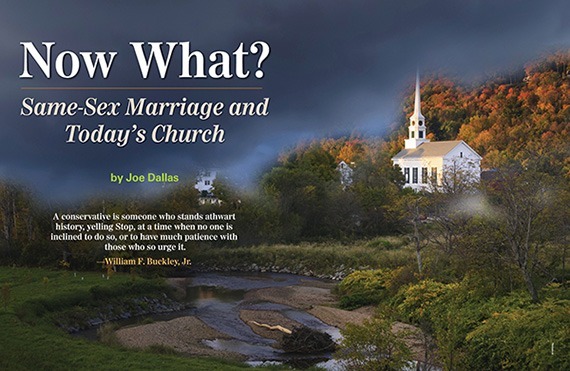This article first appeared in the CHRISTIAN RESEARCH JOURNAL, volume 37, number 01 (2014). The full text of this article in PDF format can be obtained by clicking here. For further information or to subscribe to the CHRISTIAN RESEARCH JOURNAL go to: http://www.equip.org/christian-research-journal/
SYNOPSIS
Recent U.S. Supreme Court decisions striking down the Defense of Marriage Act, and essentially nullifying California Proposition 8’s ban on same-sex marriage, mark a new era in America’s approach to homosexuality and the church’s response as well. Since the right of same-sex couples to marry has been all but ratified by the court, and since public opinion has solidly shifted toward acceptance of homosexual marriage, individual believers, church bodies, and parachurch ministries face a complex set of questions and challenges.
Specifically, Christians will face invitations to same-sex wedding ceremonies and interactions with households headed by homosexual couples at all social levels, along with charges of prejudice, ignorance, or worse if they continue to uphold traditional definitions of sex and family. Churches and their denominational governors will face facility requests for same-sex unions, participation by gay and lesbian couples in activities reserved for married couples, participation in Sunday School classes and youth groups by children of same-sex households, and direct challenges from activists seeking to persuade churches to embrace a “gay-affirming” approach to ministry. Parachurch organizations will face mounting pressures to adhere to secular antidiscrimination laws in their hiring practices and corporate activities, and a plethora of lawsuits, hearings regarding tax-exempt status, and statutory restrictions on speech and expression. The overriding question becomes: How we are to respond to social pressure, cultural stigmatization, and legal sanctions if we continue to uphold the biblical definition of marriage, the family, and normal/God-ordained sexual expressions? It is still entirely possible to fulfill biblical mandates to make disciples and convey the full counsel of God on sexual matters, provided we are willing to maintain watchfulness, revisit traditional approaches to ministry, and remain flexible when flexibility will not jeopardize conscience or biblical standards.
A conservative is someone who stands athwart history, yelling Stop, at a time when no one is inclined to do so, or to have much patience with those who so urge it.
—William F. Buckley, Jr.
Maybe we’ve had it too easy. Historically in America, the Christian voice was not only heard but also affirmed. Values preached from the pulpit on Sunday were echoed at school, home, the workplace, and even, to a large extent, through the entertainment industry. Surely the culture was never the church, but on questions of moral versus immoral, or natural versus unnatural, the same mores prevailed in virtually all sectors. So whether or not our theology was accepted (often yes, sometimes no), the relational guidelines springing from that theology were seldom challenged, making biblical standards regarding family and sexuality the commonly held standards of the community as well.
So though we’ve been accustomed to at times having to articulate, then defend against criticism, the basic doctrines of the faith—Christ’s divinity, biblical inspiration and accuracy, evidence confirming the resurrection—the sexual values associated with Christianity haven’t been the realm of apologists. We simply haven’t been on the defense in that arena or, if we have, the opposition from culture to church has been minimal.
No more. With astonishing speed, our nation has shifted its sexual standards, and in no area is the shift more significant than that of homosexuality. It’s largely, if not entirely, been encoded as a norm, and same-sex marriage can’t be far behind. Christians holding to the traditional view of human sexuality are now yelling stop when no one seems inclined to do so and, indeed, when hostility toward the yeller is escalating. Even a casual look at our landscape raises not the question of how we can halt same-sex marriage, but rather, how we can best function as ambassadors for Christ in a society that has overwhelmingly accepted it, thereby rejecting His definition of the most basic human institution (see Matt. 19:4–6). America has essentially though not completely gone pro-gay; same-sex marriage is fast becoming the law of the land. So what are the ramifications for modern believers, and where do we go from here?
WHAT THE DATA SHOWS
First, the facts. As of this writing (October 2013), polls show a slim majority of Americans support the redefinition of marriage to include homosexual couples. In June, the Pew Research Center found that 51 percent polled now favor same- sex marriage, with 59 percent of both supporters and opposers describing it as “inevitable.”1 Gallup gleaned similar results from a July polling showing 52 percent of Americans eighteen and older would support a federal law recognizing same-sex marriage in all states, with 43 percent in opposition. NBC News/Wall Street Journal weighed in, showing 53 percent of respondents now favor legalization of homosexual marriage.2
Noteworthy points are raised in the Pew Research Center data, showing changes in public attitudes toward homosexuality over the past ten years. In 2003, 37 percent of respondents held a “favorable” view of gay men, while 51 percent took an “unfavorable” view of them. By 2013, the numbers had done an about face, showing 55 percent holding a favorable view, and 32 percent citing an unfavorable one.3
On the same-sex marriage issue, one in seven respondents claimed to have “changed their mind,” in most cases because they now know someone who is openly homosexual.4 Weekly churchgoers still largely disapproved of these trends, with only 23 percent condoning them, according to Gallup.5
Notable is the fact that resistance to the redefinition of marriage has overwhelmingly come from conservative Christians, but even in that population a generation gap seems to exist. A Times-Picayune survey, for example, showed 44 percent of self-identified evangelicals between the ages of eighteen and twenty-nine supporting the rights of homosexual couples to marry, support for the right to marry possibly but not necessarily indicating approval of homosexuality itself.6 Since the same poll found evangelical opposition to homosexuality hovering around 80 percent, the chasm between the attitudes of young and older believers is clear.
The direction the polls are trending (supporters of same-sex marriage increasing; opponents decreasing) makes it easy to envision an America in which the majority of nonbelievers will view homosexuality as normative, while most Bible-believing Christians will disapprove of it. Younger believers will either follow suit, adopt a pro-gay position, or disapprove of homosexuality but feel less inclined than their elders to voice an anti-gay position in public.
Influencing and no doubt energizing the trend are recent U.S. Supreme Court decisions regarding the Defense of Marriage Act (DOMA) and California’s controversial Proposition 8, passed by state voters in 2008 to affirm the exclusively heterosexual definition of marriage. Last June the justices voted to overturn the section of DOMA that denies federal benefits to same-sex couples, declaring such exclusion unconstitutional. The same justices ruled to let stand a lower court ruling on Proposition 8, which had declared it to be unconstitutional as well. Gay marriage proponents were understandably thrilled, among them President Obama, who cheered the rulings by noting, “We are a people who declared that we are all created equal—and the love we commit to one another must be equal as well.”7
HOW SHOULD CHRISTIANS RESPOND TO ALL THE CHANGE?
Those maintaining the traditional position are now in the minority, an uncomfortable, sometimes uncertain place. From it, we can rail against these trends, bury our heads in despair over them, or meet them responsibly, as stewards of truth in a time when truth is often unwanted and unpopular.
To steward truth properly, we need to first know it, live in conformity to it, and then express it. So Paul exhorted Timothy to first take heed to himself and doctrine (1 Tim. 4:16), reminding him that Scripture is not only inspired but also profitable for “teaching, for reproof, for correction, for training in righteousness, so that the man of God may be adequate, equipped for every good work” (2 Tim. 3:16–17, NASB). By knowing and living in conformity to truth, we’re more “apt to teach, patient, in meekness instructing those that oppose themselves; if God peradventure will give them repentance to the acknowledging of the truth” (2 Tim. 2:25, KJV).
First it has to be known. If God has spoken on a subject, as He has on this one, then we need to be well versed in what He’s said. Then, if we are to speak with any integrity to sexual morality, we must first ensure that our own sexual behaviors are in line with created intent as revealed in Scripture. Finally, having first known then lived the truth, we’re obliged to express it, creatively, respectfully, and clearly, as opportunity allows. Opportunity, in this case, seems to come by way of personal challenges, professional challenges, and ministry challenges. A new look at living and speaking the truth in all three areas is called for.
Personal Challenges: Salt, Light, and Loving Thy Neighbor
Invitations to same-sex weddings will come to more and more Christians, leaving them with a choice between attending a ceremony they don’t fully support, or declining as kindly and respectfully as possible, clarifying their reasons and striving to express good will as they do. Arguments can be made for both options, and while I endorse the second, sincere believers may also choose the first. (For a fuller treatment of the subject, see the pro/con Christian Research Journal article “Should Christians Attend Same-Sex Weddings?”8)
Loved ones will continue to “come out” as gay or lesbian to Christian families. Families, in turn, will wonder how to sustain their bonds with homosexual loved ones while looking for opportunities to discuss the subject with them and ways to discuss it effectively. Paul’s balanced approach—living peacefully with all as much as possible (Rom. 12:18) while not partaking in another person’s sin (1 Tim. 5:22) nor violating one’s own conscience (Rom. 14:23)—is applicable here, and decisions made within Christian homes facing this situation can and should be made with these three Scriptures as guideposts. (For family guidance, see my book When Homosexuality Hits Home.9)
Interactions with lesbian and gay people will increase as Christians find more friends and coworkers openly identifying as homosexual. These interactions, in turn, can and should become ministry opportunities, as conversations turn to matters of sexuality, faith, and morality. Witnessing to openly gay people will be especially challenging, as more and more homosexuals are coming to view Christians as homophobic or bigoted. But beginning the conversation by addressing the question of whether or not we have a Creator, and whether or not that Creator has intentions for us, and whether or not those intentions can be discerned and how, opens up a terrific dialogue on worldview and how we arrive at it, which in turn segues beautifully into a gospel presentation. (For guidelines on witnessing to gays, see the Christian Research Journal article “Speaking of Homosexuality.”10)
Professional Challenges: Being about Our Father’s Business while Managing Our Own
Christian business owners can’t avoid dealing with homosexual people, nor should they try. Usually the pleasant or unpleasant nature of office interactions will be determined more by the personalities involved than their sexual orientations, and the business at hand usually will not require the Christian owners to question whether engaging with homosexual people warrants a compromise. But as times change, tensions may rise between what a believer feels he can or cannot in good conscience do, versus what state or federal laws in fact require him to do. A Christian photographer found, for example, that if he refused to service a same-sex wedding and reception, he’d then face lawsuits.11
Christian caterers refusing gay wedding events have found investigations waiting for them.12 Churches leasing their facilities out for weddings are now finding they may not be able legally to decide who rents the property.13
It would be naïve in the extreme to consider these isolated incidents rather than a growing pattern, so believers in the marketplace will need to determine prayerfully under what circumstances they can in good conscience perform certain transactions, or offer particular services. The question becomes three-fold: Can I do this in good faith? If not, am I ready and willing to fight (via the courts if necessary) for my right to refuse this? Or am I ready and willing to find another line of work? I’m sure the caterer, photographer, and church administrator involved in the situations mentioned above never thought they’d have to ask themselves such questions, but watch the trends. More and more of us will be joining their company.
Ministry Challenges: Revise, Revisit, Reinforce
Recent events serve as warning signs to ministers in 2014 and beyond: speak the truth, and be careful and prayerful as you do so. Consider just a few examples of the times and, it’s not a stretch to say, the treacheries.
The American Family Association, a conservative ministry that has for years educated and equipped the public, churches, and individuals on sexual issues from a conservative perspective, officially has been listed by the Southern Poverty Law Center (a well-known liberal civil rights organization) as a “hate group.” Accordingly, U.S. Army trainers are now evidently referring to this ministry as one on par with the Ku Klux Klan, neo-Nazis, and Black Panthers, advising soldiers they may face disciplinary action if they associate with such a “hate group.”14
California and New Jersey now have laws on their books banning licensed therapists from offering what is known as “reparative therapy” (therapy aimed to convert homosexuals to heterosexuals) to minors.15 Adults seeking such treatment are, as of this writing, still free to do so. While reasoned arguments can be made for or against such laws, the obvious concern for any pastor is whether he eventually will be subject to penalties if he advises a teenaged parishioner that homosexuality is outside God’s will, and that he should thereby abstain from it.
Before insisting such a heavy-handed clampdown on ministers is unthinkable, let’s remember that a full ten years ago in Sweden, Pastor Ake Green was sentenced to jail for violating Swedish laws against “hate speech” when he condemned homosexuality from the pulpit16 and Brazil recently considered legislation barring pastors from preaching against homosexuality under threat of imprisonment.17
Meanwhile, via more peaceable aggression, gay Christian apologist Matthew Vine, who first gained visibility via his YouTube video promoting a pro-gay interpretation of Scripture,18 is now launching a campaign to send trained volunteers into fifty American evangelical churches with the express purpose of meeting with the pastors, opening a dialogue, and persuading them that homosexuality is compatible with the faith.19
But other approaches are more draconian. Pastor Louis Giglio of Passion City Church of Atlanta, who President Obama himself was involved in selecting for his 2012 inauguration ceremony, was pressured by gay activists to withdraw his participation because of remarks he made regarding homosexuality years ago in a sermon.20 Pastor Greg Laurie of the Harvest Crusade was also pressured, unsuccessfully, by gay activists calling for him to step down as chairman of the National Day of Prayer because of his traditional stance on sexuality.21
All of this is sobering, if not daunting, to a pastor who simply wants to preach the full counsel of God without distraction. But distraction is here, making itself known to the church, and a response is demanded. Briefly, then, let me offer one that is threefold and simple: revise, revisit, and reinforce.
We can revise both our attitudes and approaches if, in fact, revision is called for. Many pastors are rightfully preaching and teaching the Word, shepherding their flocks, and speaking to current issues from a balanced and biblical perspective. Some, though, would benefit from a fresh look at the way they address this. The Bible condemns homosexuality as one of many sins, neither greater nor lesser than adultery, fornication, or incest. If a pastor emphasizes this sin, referring to it with a vehemence he doesn’t express when addressing other sexual sins, then his approach needs revision. If he speaks contemptuously of homosexuals, resorting to sarcasm and mimicry, revision is called for. Or if he avoids the subject out of fear of controversy, his timidity needs to give way to a sounder, bolder stance. We can preach the right things in all the wrong ways, either too aggressively or too meekly. When either conviction or compassion is being compromised, a revision is in order.
We can revisit essential but oft-neglected biblical themes, such as the struggle between the flesh and the spirit (Gal. 5:17), the fallen nature we inherited from Adam and the need to reckon it as dead (Rom. 6:11), and the challenge to run our race patiently, shedding sin that easily besets us (Heb. 12:1). These themes are hugely relevant to the woman or man sitting in the pew wrestling with homosexual tendencies, tendencies that all too often are interpreted by the struggling Christians as a sign she or he is fundamentally flawed, strange, and different. When pastors educate believers via a biblical perspective of human nature, they are thereby better equipped to deal with their struggles, sexual or otherwise, with biblically based tools and concepts.
And we can reinforce essential truths about human sexuality, moral purity, and sanctification by teaching clearly from our pulpits the Creator’s design for the family and its central role in life; by offering discipleship and accountability groups for men and women struggling to maintain their purity; by offering specific care for women and men struggling against homosexuality and wanting direction and encouragement; by helping Christian parents and family members navigate the often troubling waters that come when a loved one is gay; and by welcoming everyone to attend our churches while clarifying the disciple’s lifestyle necessary for church membership.
In a way, fighting the good fight was never less inviting. Controversy can be exhausting, and who’s got the time or energy for needless contentions, whether with fellow believers or nonbelievers? Yet more than ever, we can’t deny how impossible it is to hold the biblical view on human sexuality without also contending for the faith (Jude 1:3), being ready to give an answer for the hope that’s in us (1 Pet. 3:15), and holding fast to what’s good (2 Thess. 5:21). Things are progressing, but not all progress is good, since you can make progress toward a cliff just as surely as you can progress toward the Promised Land. So God grant us a patient and unwavering spirit, a deeper rooting and grounding in truth, and more of the spirit that inspired Martin Luther to say, during his own time of pressure and controversies, “My conscience is held captive by the Word of God. And to act against conscience is neither right nor safe.”
Joe Dallas is the program director of Genesis Biblical Solutions in Tustin, California, a Christian biblical counseling service to men dealing with sexual addiction, homosexuality, and other sexual/relational problems. He is a member of the American Association of Christian Counselors and is the author of seven books on human sexuality, including The Gay Gospel? How Pro-Gay Advocates Misread the Bible (Harvest House, 2007) and A Strong Delusion (Harvest House, 2006).
NOTES
- “Gay Marriage: Key Data Points from Pew Research,” Pew Research Center, June 11, 2013, http://www.pewresearch.org/key-data-points/gay-marriage-key-data-points-from-pew- research/.
- “Gallup Gay Marriage Poll Finds Majority of U.S. Citizens Would Support Nationwide Marriage Equality Law,” The Huffington Post, July 31, 2013, http://www.huffingtonpost.com/2013/07/31/gallup-gay-marriage-poll-_n_3682884.html.
- “Gay Marriage: Key Data Points from Pew Research.”
- Ibid.
- “Gallup Gay Marriage Poll,” The Huffington Post.
- Bruce Nolan, “Young Evangelical Adults Stand Apart from Their Elders on Same-Sex Marriage,” New Orleans Times-Picayune, September 1, 2011, http://www.nola.com/religion/index.ssf/2011/09/young_adults_even_in_church_st.html.
- Abby D. Phillips and Ariane De Vogue, “Supreme Court Bolsters Gay Marriage Advocates in DOMA, Prop 8 Rulings,” ABC News, June 26, 2013, http://abcnews.go.com/Politics/supreme-court-rules-gay-marriage- cases/story?id=19492896.
- Michael F. Ross and Joe Dallas, “Should Christians Attend Same-Sex Weddings?” Christian Research Journal 25, 5 (2012), available at http://www.equip.org/christian- research-journal/should-christians-attend-same-sex-weddings/.
- Joe Dallas, When Homosexuality Hits Home (Eugene, OR: Harvest House Publishing, 2004), available in the Christian Research Institute resources at http://www.equip.org/bookstore/sexuality-package/.
- Joe Dallas, “Speaking of Homosexuality,” Christian Research Journal 29, 6 (2006), available at http://www.equip.org/articles/speaking-of-homosexuality/.
- Doug Mataconis, “Court Holds That Wedding Photographer Cannot Refuse Service to Gay Couples,” Outside the Beltway, August 24, 2013, http://www.outsidethebeltway.com/court- holds-that-wedding-photographer-cannot-refuse-service-to-gay-couples/.
- Allahpundit, “Oregon Bakery Closes Doors after State Investigates over Refusal to Cater Same-sex Wedding,” Hot Air, September 3, 2013, http://hotair.com/archives/2013/09/03/oregon-bakery-closes-doors-after-state-investigates- over-refusal-to-cater-same-sex-wedding/.
- Barbara Bradley Hagerty, “Gay Rights, Religious Liberties: A Three-Act Story,” NPR News, June 16, 2008, http://www.npr.org/templates/story/story.php?storyId=91486340.
- Todd Starnes, “US Army Defines Christian Ministry as ‘Domestic Hate Group,’” FoxNews.com, October 14, 2013, http://www.foxnews.com/opinion/2013/10/14/us-army-defines-christian-ministry-as-domestic-hate-group/.
- Molly Redden, “The Legal Battle for Gay Conversion Therapy Is a Losing One,” The New Republic, August 20, 2013, http://www.newrepublic.com/article/114385/gay-conversion-therapy-faces-legal-battles-california-new-jersey.
- Keith B. Richburg and Ala Cooperman, “Swede’s Sermon on Gays: Bigotry or Free Speech? Pastor Challenges Hate-Law Restrictions,” Washington Post Foreign Service January 29, 2005, http://www.washingtonpost.com/wp-dyn/articles/A45538-2005Jan28.html.
- Gudrun Schultz, “More Details on the Proposed Brazil Law to Jail Pastors Who Preach Homosexual Activity Is Sin,” com, March 22, 2007, http://www.lifesitenews.com/news/archive//ldn/2007/mar/07032203.
- “The Gay Debate: The Bible and Homosexuality,” http://www.youtube.com/watch?v=ezQjNJUSraY.
- “Christian Hopes to Reform Churches on Homosexuality,” USA Today, September 19, 2013, http://www.usatoday.com/story/news/nation/2013/09/19/christian-reform- homosexuality/2840629/.
- Dave Boyer and Cheryl Wetzstein, “Pressure from Gays Pushes Pastor off Inaugural Agenda,” The Washington Times, January 10, 2013, http://www.washingtontimes.com/news/2013/jan/10/obama-inaugural-pastor-steps-down-over-anti-gay-re/?page=all.
- Alex Murashko, “Greg Laurie Says He Went to DC to Pray, Not Fight with Gay Activists” The Christian Post, May 27, 2013, http://www.christianpost.com/news/greg-laurie-says-he- went-to-dc-to-pray-not-fight-with-gay-activists-96696/.









